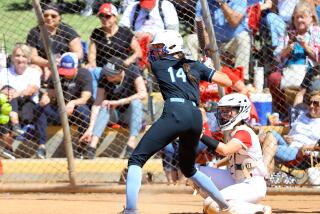PAN AMERICAN GAMES : They Can Play Some Hardball : Softball: U.S. women are dominating, waiting for the chance to show their stuff in 1996 Olympics.
- Share via
SANTIAGO DE CUBA, Cuba — Times really haven’t changed that much in softball, baseball’s neglected stepchild.
Players on the U.S. national teams still listen with clenched teeth as weekend league players speculate on how they would fare in international competition. Baseball players rarely give the sport a thought. Even knowledgeable sports fans are barely aware that softball is played at any level other than the local ballpark.
Susie Gaw, who at 31 is the oldest member of the U.S. women’s softball team in the Pan American Games, was talking Thursday about the old days, when the sport was brought to the people by barnstorming tours through small-town America.
For instance, teams used to pile into buses and drive long distances to games.
“We don’t do that stuff anymore,” Gaw said.
How, then, does her team, the Orange County Majestics, travel?
“In vans,” she said.
Yes, it’s a brave new world in softball, now that it has been accepted as a medal sport for the 1996 Olympic Games. The softball community would like to think that inclusion in the Olympics will give their sport the respect and attention they have yearned for. Team handball officials hoped for the same thing. So did the athletes who compete in field hockey.
It may be that softball will be lost in the Olympic marketplace. Softball has always thrived in small towns, where the fast-moving sport can be given the fans’ full attention, far from the distraction of professional sports.
So too, is softball blooming in this small town. Attendance at Pan Am events both here and in Havana has been uniformly high, but softball is drawing 4,000 to a 3,000-seat stadium. Fans are spilling out of the newly built Micro 4 and have ensconced themselves behind the outfield fence, sitting on high mounds of dirt left by construction of the facility.
Vince and Jackie Dobbelaar of Seattle, parents of U.S. shortstop Brenda Dobbelaar, proudly note that they have introduced the Wave to Micro 4 Stadium and have even led a combined “U.S.A., Cuba” cheer.
In a country where baseball is the most popular sport, fans are crossing over in amazing numbers. Many are coming to see pitcher Debbie Doom of El Monte, whose name has foreshadowed the fate of opposing teams. In two starts, Doom has pitched two perfect games, striking out 34 batters.
Doom’s performances have added to the mystique of an American team that is having its way with this tournament. The United States is 6-0 and has defeated opponents by a combined score of 36-0. Additionally, these softball players want to be here--in fact, are delighted to be anywhere.
They are mainly happy to have made it through a weeklong tryout/boot camp at Colorado Springs, Colo., in June. Sixty players were invited, and after a regimen that included two nine-inning games a day--softball is a seven-inning game--the number was reduced to 36. The final 18 made the Pan Am team.
“Believe me, no one would have gone through that tryout if she didn’t want to be here,” said Michele Granger, a pitcher from Placentia.
That’s more to the point. Softball players are here because they don’t really have any other major international competitions. In this sport, the Olympic Festival becomes a big thing. The Pan Am Games are a dream. Now, with the prospect of the Olympics in the future, there is more incentive for players to stay in the sport.
“There’s not a lot for us each year,” said Gaw, who has been on all four Pan Am teams since the sport was introduced in 1979. “They kind of dangle it out there enough to keep you interested.”
The Pan Am Games have been the ultimate showcase for softball outside the World Championships. The U.S. Pan Am teams have been proud ones: They are 27-2 in medal rounds and have lost the gold medal only once.
Outside these few opportunities, softball has little. There are pro leagues in New Zealand and Italy, but they are restrictive toward Americans. Various attempts to sustain a women’s pro league in the United States have failed, most recently in the mid-1970s. The women’s professional baseball league, which flourished during World War II, was an anomaly.
“The women’s pro softball leagues have failed because they didn’t take advantage of the fans,” Granger said. “They should have had a tour like golf. You can’t have a team dependent on a gate. We draw well--we’re drawing well here--but you have to stay in the smaller towns.”
The game is in a smaller town now and is filling the stands, as if to underscore the point. Doom can’t seem to remember how many other perfect games she has thrown--10, possibly--but she is quite sure that the Olympics will take softball to another level. Perhaps out of the small towns.
“I love that we are in the Olympics,” Doom said. “They have always been a dream to athletes. They have always been a dream for me, even though I (didn’t think) I could go in softball. Now, everywhere we go, we have to sell the game and show people what we can do.”
So, at least until 1996, softball will be barnstorming again. On the road through Middle America, Central America, southern Cuba or wherever people will come out to watch.
Just like the old times.
More to Read
Go beyond the scoreboard
Get the latest on L.A.'s teams in the daily Sports Report newsletter.
You may occasionally receive promotional content from the Los Angeles Times.







